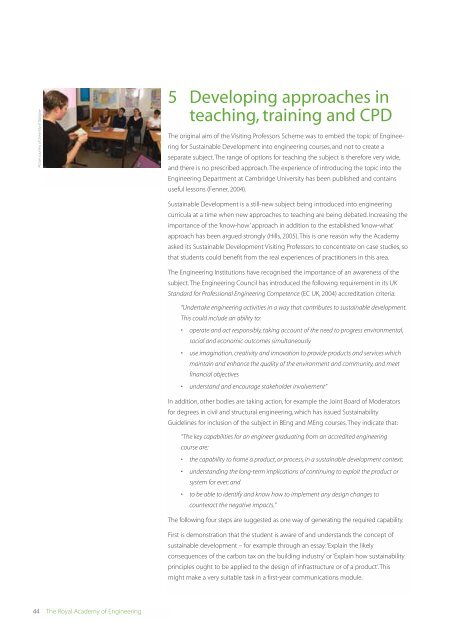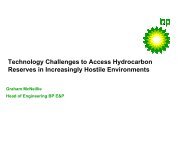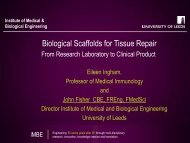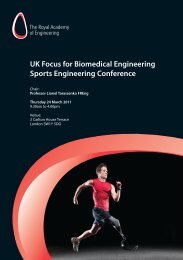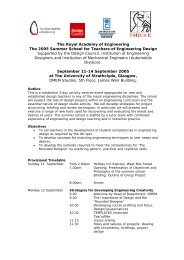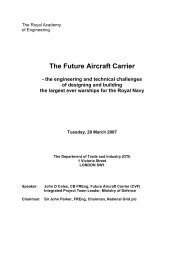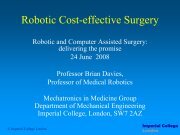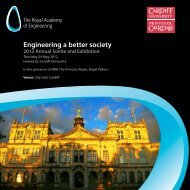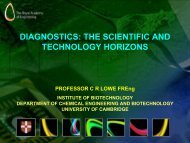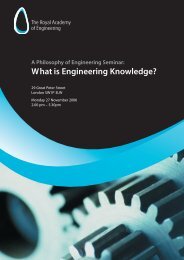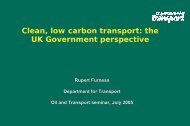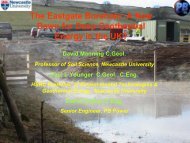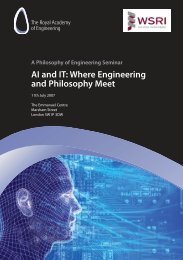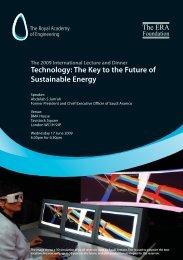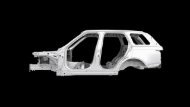Engineering for Sustainable Development: Guiding Principles
Engineering for Sustainable Development: Guiding Principles
Engineering for Sustainable Development: Guiding Principles
You also want an ePaper? Increase the reach of your titles
YUMPU automatically turns print PDFs into web optimized ePapers that Google loves.
Picture courtesy of University of Glasgow<br />
5 Developing approaches in<br />
teaching, training and CPD<br />
The original aim of the Visiting Professors Scheme was to embed the topic of <strong>Engineering</strong><br />
<strong>for</strong> <strong>Sustainable</strong> <strong>Development</strong> into engineering courses, and not to create a<br />
separate subject. The range of options <strong>for</strong> teaching the subject is there<strong>for</strong>e very wide,<br />
and there is no prescribed approach. The experience of introducing the topic into the<br />
<strong>Engineering</strong> Department at Cambridge University has been published and contains<br />
useful lessons (Fenner, 2004).<br />
<strong>Sustainable</strong> <strong>Development</strong> is a still-new subject being introduced into engineering<br />
curricula at a time when new approaches to teaching are being debated. Increasing the<br />
importance of the ‘know-how’ approach in addition to the established ‘know-what’<br />
approach has been argued strongly (Hills, 2005). This is one reason why the Academy<br />
asked its <strong>Sustainable</strong> <strong>Development</strong> Visiting Professors to concentrate on case studies, so<br />
that students could benefit from the real experiences of practitioners in this area.<br />
The <strong>Engineering</strong> Institutions have recognised the importance of an awareness of the<br />
subject. The <strong>Engineering</strong> Council has introduced the following requirement in its UK<br />
Standard <strong>for</strong> Professional <strong>Engineering</strong> Competence (EC UK, 2004) accreditation criteria:<br />
“Undertake engineering activities in a way that contributes to sustainable development.<br />
This could include an ability to:<br />
• operate and act responsibly, taking account of the need to progress environmental,<br />
social and economic outcomes simultaneously<br />
• use imagination, creativity and innovation to provide products and services which<br />
maintain and enhance the quality of the environment and community, and meet<br />
financial objectives<br />
• understand and encourage stakeholder involvement”<br />
In addition, other bodies are taking action, <strong>for</strong> example the Joint Board of Moderators<br />
<strong>for</strong> degrees in civil and structural engineering, which has issued Sustainability<br />
Guidelines <strong>for</strong> inclusion of the subject in BEng and MEng courses. They indicate that:<br />
“The key capabilities <strong>for</strong> an engineer graduating from an accredited engineering<br />
course are:<br />
• the capability to frame a product, or process, in a sustainable development context;<br />
• understanding the long-term implications of continuing to exploit the product or<br />
system <strong>for</strong> ever; and<br />
• to be able to identify and know how to implement any design changes to<br />
counteract the negative impacts.”<br />
The following four steps are suggested as one way of generating the required capability.<br />
First is demonstration that the student is aware of and understands the concept of<br />
sustainable development – <strong>for</strong> example through an essay:‘Explain the likely<br />
consequences of the carbon tax on the building industry’ or ‘Explain how sustainability<br />
principles ought to be applied to the design of infrastructure or of a product’. This<br />
might make a very suitable task in a first-year communications module.<br />
44 The Royal Academy of <strong>Engineering</strong>


